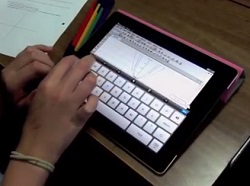Anyone who comes into contact with young people regularly will be well accustomed to their subversive use of the English language. To them, ‘sick’ no longer means feeling ill; ‘sound’ has nothing to do with what you can hear; to be ‘wicked’ does not mean you are bad. Then there is the derogatory use of the word ‘gay’ in the ‘banter’ they so like to indulge in. This is, of course, not a recent phenomenon. Since the beginning of time each new generation has developed its own use of slang to promote and develop its own individual identity.
Teacher Daniel Edwards, who uses iPads with his A-Level PE class, has reported the biggest improvement in his students' grades since he began teaching. He also comments on a record breaking set of GCSE results encountered at a Foundation in Cambridge after they implemented a 1:1 learning programme. This provides a great source of encouragement for adopters of the tablet into their lessons.

I should state from the outset I’m not sure the impact of any new technology in the classroom will ever be truly measurable.
It won’t be for the want of trying and there are a number of case studies trying to do just that. However, with that in mind, what conclusions can I draw from two years of iPad use in the classroom?
I have two areas that can be discussed anecdotally. The first is an A level class of 15 students who have spent the last two years studying PE using iPads. They recorded the best A-Level results in my ten years at the school. For those familiar with the way UK grades are measured, the value-added average was +17%.

A community-driven platform for showcasing the latest innovations and voices in schools
Pioneer House
North Road
Ellesmere Port
CH65 1AD
United Kingdom